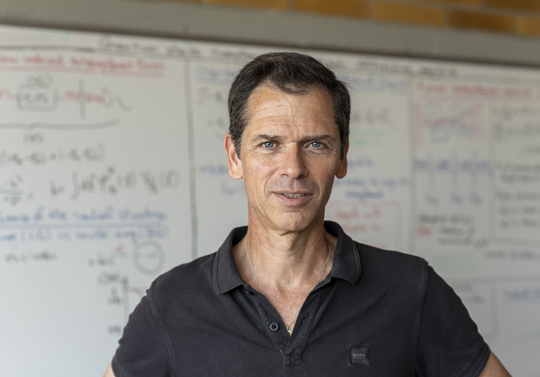“There’s an enormous amount happening in the field”
Freiburg, Sep 18, 2019
Physics Teams Up: the Deutsche Physikalische Gesellschaft (DPG) is organizing an autumn conference for curious members of the public, trainee and current school teachers, and of course academics. All three professional divisions of the DPG are jointly supporting the new format of meeting. They will be tackling just one major subject area – “Quantum science and information technology”. This is also a new idea, says local symposium leader Prof. Dr. Andreas Buchleitner. The Professor of Quantum Optics and Statistics at the University of Freiburg’s Institute of Physics spoke with Jürgen Schickinger about what the many innovations are all about and why he believes we need to look at the potential risks ahead.

Releasing energy: the conference takes an interdisciplinary approach to a current scientific issue and wants to bring together researchers from different fields of study.
Photo: agsandrew/stock.adobe.com
Mr. Buchleitner, why has the DPG launched a new form of event?
Andreas Buchleitner: We wanted a conference that took an interdisciplinary approach to a current scientific issue and brought together researchers that don’t meet that often. The three DPG sections, Condensed Matter (SKM), Atomic, Molecular, Plasma Physics and Quantum Optics (SAMOP), and Matter and Cosmos (SMuK) also each hold separate meetings.
You want to address the public, teachers and non-specialists as well?
Yes, we’re also expecting participants who aren’t yet specialists in quantum technology or information technology. So a lot of the lectures will be introductory in nature and present important principles comprehensibly. They will also be suitable for teachers and student teachers. Teachers can take part in the conference for free, so can students of the University of Freiburg who haven’t yet gained their Master’s or similar degree. We’ve even set up a special part of the program on the subject of teaching. On top of that, we want to spread knowledge throughout society. So there are public events on three evenings, which are also free.
Is quantum technology already present in everyday life?
Yes, frequently: for instance lasers in CD players, integrated computer circuits, GPS systems and MRI scanners are already based on quantum mechanics. It may well be the most successful scientific theory as regards applications. Quantum computers will take up a large share of the conference. Scientifically they are the most exciting development in the current second quantum revolution. This aims to manipulate and control many individual quantum particles synchronously and then precisely measure their statuses.
Quanta can for example rotate in two directions simultaneously. It blows the mind. Can you explain in simple terms what distinguishes quantum computers from traditional ones?
Ordinary computers work with Bits, which either have the value 1 or 0. One precludes the other. Quantum computers work with qubits or quantum bits, which because of the principle of superpositioning can have both statuses simultaneously. To put it in extremely simplified terms: normally, when someone is walking in the park, they have to decide which way to go each time they reach a fork in the path. By contrast, a quantum walker can take every possible track on just one walk – which would make it far easier to find a lost key, for instance.

Quantum mechanics may be the most successful scientific theory for applications, says Andreas Buchleitner. Photo: Patrick Seeger
What actual difference does this make to performance?
At the moment there are very few algorithms that quantum computers can use to process special problems better than ordinary computers. But if quantum technology matches up to its promises, quantum computers will one day be far faster. How much faster, no one really knows. In theory there is no reason why it wouldn’t be a million times more powerful.
How far has development come?
Not far: using what you might call “quantum Lego” we can connect two or three quanta or maybe a couple more with one another really synchronously. That can be enough for some special applications. But for computers that can solve every possible task, we currently estimate we’d need several thousand quanta. But there’s an enormous amount happening in the field. Quantum technology is extremely interesting to industry – we’ve also got a speaker from Bosch here – and for young people.
Why do you think it is important to talk about potential consequences of the technology at such an early stage?
Previously we didn’t talk about it. I think that was a mistake. Like classic digitization, quantum technology will obviously give us new tools, which can be used in many different ways. In order for society not to be overtaken by events again, we should be thinking about the technical consequences now. The idea, as always, is to make intelligent and civilized use of new technology. Scientists have the best concept of what you can, in certain circumstances, expect of the technology that they are researching. Therefore there is also a responsibility in social discourse, when it is desirable for us to contribute with the scientific cardinal virtue of skepticism. The evening event for the public “Research between hype and hope”, a panel debate involving the public, concerns the interplay between enthusiasm, expectation and trust in science. And on Thursday evening we invite the public to a talk on all the scientific trends that are discussed at the conference.
Do quantum computers also bring novel problems?
Functioning quantum computers will be able to solve difficult algorithmic problems in far less time than this is possible with traditional computers today – for example, to crack encryption systems. That’s one of the obvious consequences. But the ones that are really interesting are those that we can’t even conceive of yet.
Who will use the technology first and would be able to abuse it?
Developing and building quantum computers is very expensive. So at present it looks as if large concerns such as Google, Microsoft, IBM and the increasingly totalitarian China are on the fast track. The former can pay for something like this out of small change. And the one-man show that is China can also direct cash flow easily. But European companies and our open societies are increasingly investing in the technology, so as not to miss the boat.
Evening events for the public
EinsteinSlam
Tuesday, 24th September 2019, 8 p.m.
Scientists aim to inspire visitors about their research in just ten minutes. all forms of presentation are allowed. At the end, the public votes on who gave the best presentation.
Research between Hype and Hope – what conditions are needed for good science?
Wednesday, 25th September 2019, 7.30 p.m.
Fishbowl-style discussion involving journalists and scientists on the role of science in an open society.
Revolution in the Quantum World?
Thursday, 26th September 2019, 7.30 p.m.
Lightning talks by three scientists and discussion about new concepts and developments in quantum technology.
All events take place at the Audimax, Kollegiengebäude II, Platz der Alten Synagoge 1, 79085 Freiburg. Admission is free.

